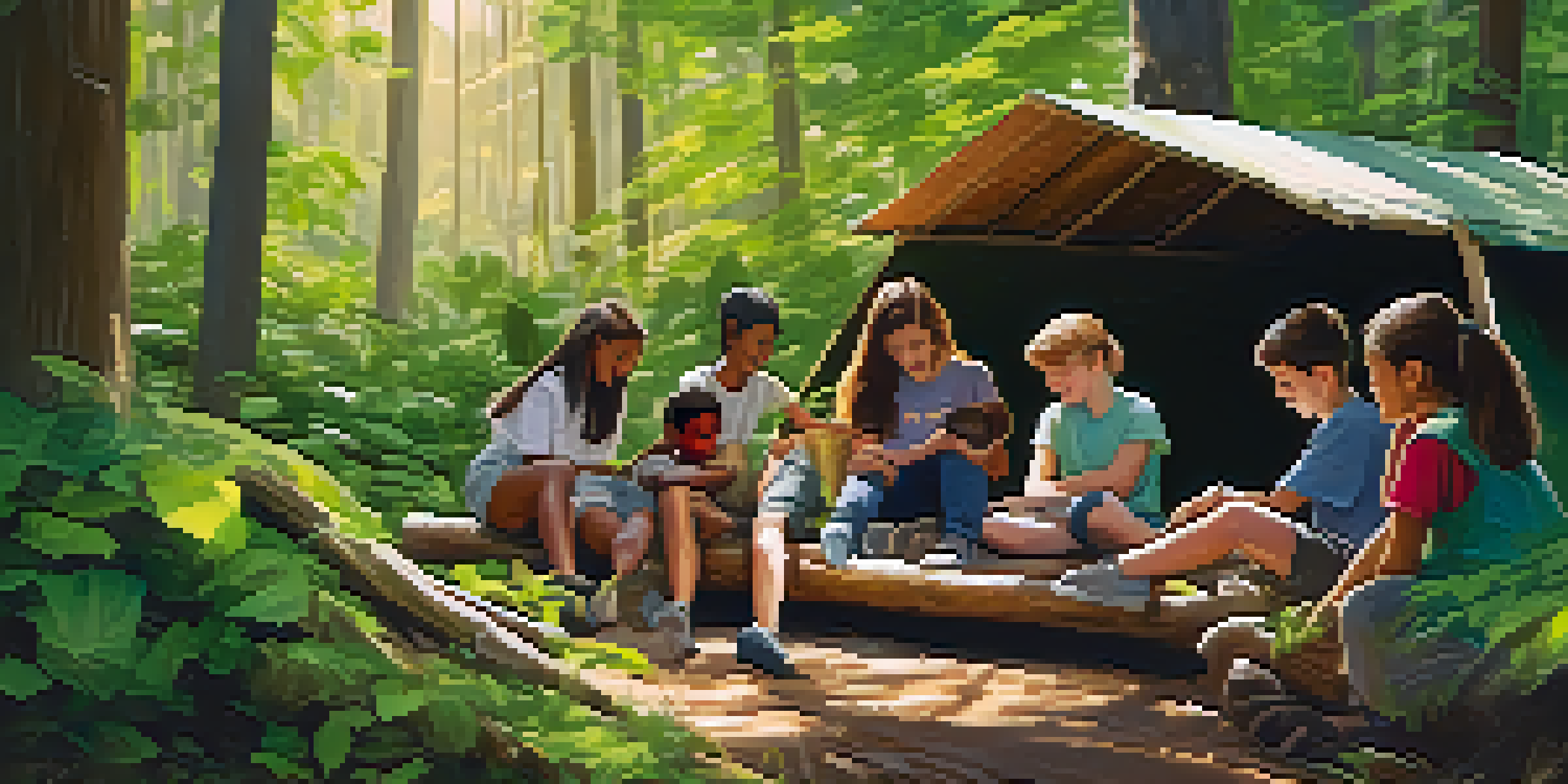Outdoor Learning and the Development of Life Skills

Understanding Outdoor Learning and Its Importance
Outdoor learning refers to educational experiences that take place outside the traditional classroom environment. This approach emphasizes hands-on activities, encouraging students to engage with their surroundings. By immersing themselves in nature, learners gain a deeper appreciation for the world around them, which can foster a lifelong love of learning.
The best classroom and the richest cupboard are roofed only by the sky.
The significance of outdoor learning cannot be overstated. It provides opportunities for experiential learning, where students can grasp concepts through real-world applications. By exploring the outdoors, learners not only enhance their academic knowledge but also develop critical thinking and problem-solving skills.
Moreover, outdoor learning contributes to emotional and social development. Interacting with peers in a natural setting can strengthen relationships and encourage teamwork. As students navigate challenges together, they build trust and communication skills that are essential for personal and professional success.
Building Resilience Through Nature
One of the most valuable life skills cultivated through outdoor learning is resilience. Nature often presents unpredictable challenges, like sudden weather changes or navigating rough terrain. Learners must adapt and find solutions, teaching them how to cope with setbacks and thrive in uncertainty.

Experiencing failure in a safe environment, such as getting lost on a trail or struggling to set up a tent, allows students to learn from their mistakes. This process is crucial for developing a growth mindset, where individuals view challenges as opportunities to improve. Resilience gained from outdoor experiences can translate to various life situations, enhancing overall well-being.
Outdoor Learning Builds Resilience
Experiencing nature's challenges helps students develop resilience and a growth mindset.
As students navigate these challenges, they also develop a sense of accomplishment. Overcoming obstacles in the great outdoors fosters self-confidence and reinforces the belief that they can tackle difficulties in everyday life. This newfound resilience often leads to a more positive outlook and a willingness to take on new challenges.
Enhancing Communication Skills in the Outdoors
Outdoor learning encourages open communication among participants, which is vital for effective teamwork. When engaged in group activities, students must express their ideas clearly and listen to others. This practice hones their ability to convey thoughts and collaborate with peers, essential skills in both personal and professional settings.
In every walk with nature one receives far more than he seeks.
Activities like group problem-solving tasks or team-building exercises require participants to articulate their thoughts and negotiate solutions. As they work together, they learn the importance of respect and understanding different perspectives. These interactions help nurture empathy, making them better communicators in various situations.
Additionally, being in a natural environment often reduces social barriers, encouraging more candid conversations. The relaxed atmosphere allows individuals to share their thoughts without the constraints of a formal setting. This can lead to deeper connections and enhance interpersonal skills that are crucial for building relationships.
Fostering Critical Thinking and Problem-Solving Skills
Outdoor learning is an excellent platform for developing critical thinking and problem-solving abilities. When faced with real-life challenges, students must analyze situations, weigh options, and make informed decisions. This active engagement promotes analytical skills that are applicable across various disciplines.
For instance, consider a scenario where students are tasked with building a shelter using natural materials. They must assess their surroundings, identify suitable resources, and devise a plan to accomplish their goal. This hands-on experience not only enhances their problem-solving skills but also encourages creative thinking.
Enhances Communication Skills
Group activities in outdoor settings foster open communication, teamwork, and empathy among participants.
Moreover, outdoor learning often involves trial and error. Students learn to evaluate their strategies and adjust their approach as needed, reinforcing the importance of flexibility in problem-solving. By developing these skills, they become more adept at navigating challenges in both academic and personal contexts.
Promoting Emotional Intelligence Through Nature
Outdoor learning experiences can significantly enhance emotional intelligence, a crucial life skill that involves recognizing and managing one’s emotions. Being in nature often evokes feelings of calm and introspection, allowing students to reflect on their thoughts and feelings. This self-awareness is the foundation for emotional growth.
Interacting with peers during outdoor activities also fosters empathy and social awareness. Learners are encouraged to understand their friends' emotions, which helps build stronger relationships. As they navigate group dynamics, they gain insights into how to support others, enhancing their emotional intelligence.
Furthermore, outdoor learning provides opportunities for stress relief and emotional regulation. Engaging with nature can have a grounding effect, allowing students to manage anxiety or frustration more effectively. By cultivating these emotional skills, they are better prepared to face life's ups and downs with resilience and grace.
Encouraging Responsibility and Independence
Outdoor learning promotes a sense of responsibility and independence among participants. When students engage in activities like camping or hiking, they are often tasked with specific roles, such as setting up camp or navigating trails. This fosters a sense of ownership and accountability for their actions.
By taking on responsibilities in a group setting, learners develop self-discipline and learn the importance of teamwork. They come to understand how their actions impact others, fostering a sense of community and collaboration. This sense of shared responsibility is a valuable lesson that extends beyond outdoor experiences.
Fosters Emotional Intelligence
Outdoor experiences promote self-awareness, emotional regulation, and stronger relationships among peers.
Moreover, outdoor learning often encourages students to step out of their comfort zones. As they tackle new challenges independently, they build confidence in their abilities. This independence not only prepares them for future endeavors but also reinforces the belief that they can handle responsibilities in various aspects of life.
Creating Lasting Memories and Connections
One of the most significant benefits of outdoor learning is the lasting memories and connections it fosters. Experiences shared in nature often create strong bonds among participants, whether they are classmates, family members, or friends. These shared moments can lead to lifelong friendships and a supportive community.
Engaging in outdoor activities, such as hiking or team-building exercises, often results in shared challenges and triumphs. These experiences can be pivotal in shaping relationships, providing a sense of belonging that is crucial for emotional well-being. The stories and laughter shared during these adventures become cherished memories.

Furthermore, the connection to nature itself can leave a lasting impact. As students explore the outdoors, they often develop a deeper appreciation for the environment. This connection can inspire a lifelong commitment to conservation and stewardship, fostering a sense of responsibility not just to their peers but to the planet as well.
The Future of Outdoor Learning and Life Skills Development
As we look to the future, the importance of outdoor learning in developing life skills cannot be understated. In an increasingly digital world, providing opportunities for hands-on, experiential learning is essential. Schools and organizations are beginning to recognize the need for outdoor programs that foster essential skills for success.
Innovative approaches, such as integrating outdoor learning into curriculums or community programs, can significantly enhance the educational experience. By prioritizing these experiences, we prepare learners for the challenges of the modern world, equipping them with skills that extend beyond academic achievements.
Ultimately, outdoor learning serves as a powerful tool in shaping well-rounded individuals. By cultivating resilience, communication, critical thinking, and emotional intelligence, we create a generation equipped to thrive in an ever-changing landscape. The skills developed in nature will undoubtedly serve students well throughout their lives.